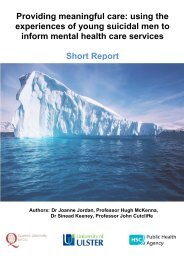Saving Mothers' Lives: - Public Health Agency for Northern Ireland
Saving Mothers' Lives: - Public Health Agency for Northern Ireland
Saving Mothers' Lives: - Public Health Agency for Northern Ireland
Create successful ePaper yourself
Turn your PDF publications into a flip-book with our unique Google optimized e-Paper software.
headaches. The indications <strong>for</strong> emergency referral of women with headaches given in the learning point<br />
box below are taken from the PRECOG guidelines 2 and are included as a brief reminder of good practice.<br />
The other recommendations are taken from the fi ndings in the relevant Chapters, 3 and 10, of this Report.<br />
Box 17.5<br />
GP learning points: severe headaches in or after pregnancy/ pre-eclampsia and cerebral bleeds<br />
Women with a headache severe enough to seek medical advice or with new epigastric pain should have<br />
their blood pressure taken and urine checked <strong>for</strong> protein as a minimum.<br />
Women with severe incapacitating headaches described as the worst they have ever had should have<br />
an emergency neurological referral <strong>for</strong> brain imaging in the absence of other signs of pre-eclampsia.<br />
The threshold <strong>for</strong> same day referral to an obstetrician is hypertension ≥ 160mmHg systolic and or ≥ 90<br />
mm Hg diastolic or proteinuria ≥1+ on dipstick. The systolic BP is as signifi cant as the diastolic.<br />
Automated blood pressure machines can seriously underestimate blood pressure in pre-eclampsia.<br />
Blood pressure values should be compared with those obtained by auscultation (an anaeroid<br />
sphygmomanometer is acceptable).<br />
Ectopic pregnancies continue to be missed, and can mimic gastroenteritis<br />
Ten women died from ectopic pregnancy; care was sub standard <strong>for</strong> seven. The two previous Reports have<br />
highlighted the lesser-known presentations of ectopic pregnancy, especially with vomiting and diarrhoea<br />
in the absence of vaginal bleeding3, 4 . It is important that GPs are aware of the possibility of ectopic<br />
pregnancy in all women of childbearing age. Avoidable deaths continue:<br />
A young woman developed abdominal pains, diarrhoea and vomiting (D&V) with one episode of<br />
fainting and a history of amenorrhoea. She had telephone contact with an out of hours GP but<br />
was not visited. The next day she had a home visit as her D&V persisted but no action was taken<br />
and the possibility of an ectopic pregnancy was not considered. The following day a relative<br />
asked <strong>for</strong> another home visit as she had been “restless” overnight, although her diarrhoea had<br />
settled. She was found dead in bed by the GP when he visited later in the day. At postmortem<br />
she had a ruptured ectopic pregnancy.<br />
Gastroenteritis is common in the community, but clinicians should be aware that in women of child bearing<br />
age diarrhoea should raise suspicion of an ectopic pregnancy, especially if there has been abdominal<br />
pain, amenorrhoea or episodes of fainting. The absence of vaginal bleeding does not exclude an ectopic<br />
pregnancy. Once again, this case highlights the potential perils of telephone consultations.<br />
Box 17.6<br />
GP learning points: ectopic pregnancy<br />
Clinicians in primary care need to be aware of atypical clinical presentations of ectopic pregnancy and<br />
especially of the way in which it may mimic gastrointestinal disease.<br />
Fainting in early pregnancy may indicate an ectopic pregnancy.<br />
Puerperal fever is not a disease of the past<br />
For many years puerperal sepsis, “childbed fever”, was a leading cause of maternal death and its<br />
signs and symptoms were widely known. The advent of antibiotics means that this illness has largely<br />
219



